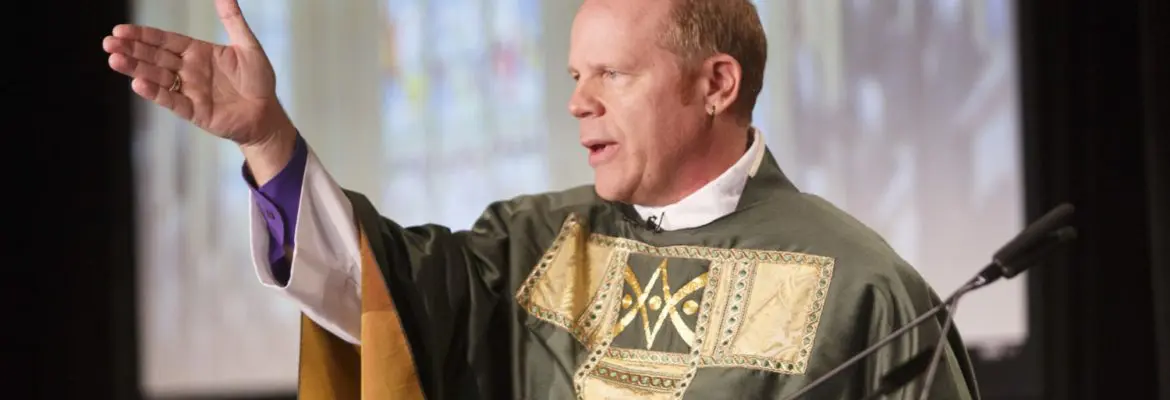
Dear Friends,
This past week was Provincial Synod, a triennial gathering of clergy and lay representatives from across the seven dioceses in the Ecclesiastical Province of Ontario. We gathered in Sault Ste. Marie, Ontario for three days of amazing worship, wonderful fellowship, and ongoing conversations about vocations and discernment. We passed important motions about the Primate’s Commission and youth voices and involvement, and we listened to inspiring talks from the guest speaker, the Archbishop of York, the Rt. Hon. and Most Rev. Stephen Cottrell.
On Wednesday, all members of Synod, wearing our orange shirts, visited the site of the former Shingwauk Residential School, which was founded and run by the Anglican Church. It was a powerful and moving day. I encourage you to visit a residential school site if you ever get the chance. I can barely describe – indeed, I am still processing – the visceral experience of walking through the heavy front doors, walking the corridors, seeing the photographs and visiting the cemetery. Large stone monuments mark the graves of staff but at least 70 graves of children are unmarked. As our Metropolitan, Archbishop Anne Germond, said, we were walking on hallowed ground.
We sat for a time in the beauty and deep silence of the historic chapel, with its old floors, arched ceiling and carved pews. We were told that it was constructed in 1881 by the resident boys of the school themselves, some as young as five years old, under the supervision of a single master carpenter. The woodwork and carvings are intricate and beautiful. The pews are worn by hand and time. The old paint on the walls is peeling and lifting. Our guides, some of whom are descendants of residential school survivors, shared that survivors hold mixed emotions about the chapel. Some refuse to visit it, for obvious reasons. For others, the chapel was a place of refuge – a space where they could see, maybe sit with, their siblings. Hold a hand, whisper a word of comfort in their mother tongue. It is a place where a deepening faith in Jesus provided hope and sanctuary. It is in the chapel that the Children of Shingwauk Alumni Association hold an annual memorial service and have done so since 1981.
As buildings age, we say that the walls begin to “weep.” Although the more popular saying goes, “If these walls could talk…,” I was conscious of the walls weeping – the paint peeling from moisture in the walls, mourning a history of trauma and abuse, of a broken relationship with the Indigenous peoples of this land, and of the failure of the Church to be the Body of Christ as we have been called to be.
This weekend, it is not lost on me that Anglican young people will be gathering for the ReCharge Retreat at Muskoka Woods Camp for a weekend of faith, fellowship and fun. The dichotomy is sobering. My wife Mary and I are truly looking forward to spending time with over 120 teenagers from across the whole Diocese of Toronto. We know from our experience with them last year that there will be lots of food, games, singing, worship, faith formation, learning and laughter – so much laughter. This is what the Church gathering its children is supposed to be like. It is heartbreaking that we have not always done so.
On Monday, Orange Shirt Day, Bishop Riscylla, Bishop Kevin, the Rev. Leigh Kern, who is our Right Relations Coordinator, and others will be gathering at Nathan Phillips Square in Toronto for the dedication and opening of the Spirit Garden, a response to the Truth and Reconciliation Commission of Canada’s Call to Action 82 and a permanent monument to memorialize this tragic part of our history. You can watch the ceremony live online, and later visit the Spirit Garden yourself when it opens to the public that afternoon. The Diocese of Toronto is one of the donors to this project, Synod Council having committed $300,000 from the Ministry Allocation Fund in 2021. It will be moving indeed to have the Spirit Garden finally open on the National Day for Truth and Reconciliation.
Please take some time this weekend and on Monday to pray: to lament the complicity of our Church in the Residential School system, and to ask God to help us work for truth and reconciliation in our land. Together we can build a new relationship between Indigenous and non-Indigenous Canadians, and to build together a country, and a Church, that – as we promised in our baptism – respects the dignity of every human being.
Yours in Christ,
The Rt. Rev. Andrew Asbil
Bishop of Toronto